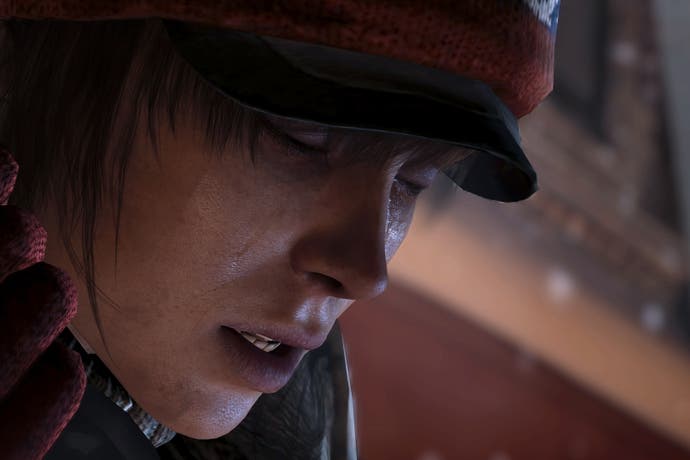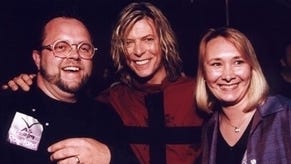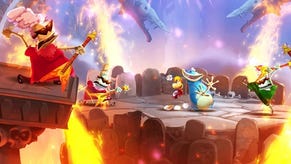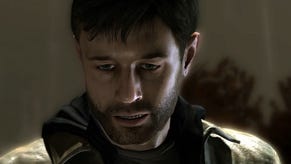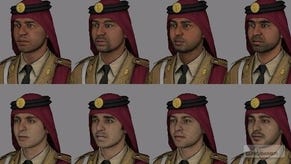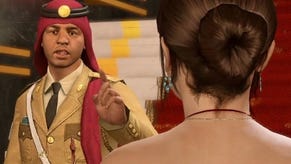Beyond: Two Souls review
Page turner.
Beyond: Two Souls has been formatted for screens it will never appear on. The entirety of this expansive, expensive paranormal thriller from French studio Quantic Dream is presented in the super-widescreen 'scope' film format, and shows between thick black bars on your TV set. Just like a movie.
It's possible that this has been done to make it easier for the PlayStation 3 to render the image. There are fewer pixels to draw between those black bars, after all, and Beyond is a technical tour de force that surely pushes this ageing machine as far as it will go. But it's hard not to see it as a stylistic choice, too. Those bars, used as "here comes the story bit" shorthand to frame cut-scenes in other games, are ever-present. Beyond is all story, and what you are experiencing is tacitly held to be bigger, grander, more epic and encompassing, than how you're experiencing it.
It's hardly a surprise. Writer and director David Cage is as obvious a proponent of the auteur theory as you can find in video games. His interviews and speeches are peppered with cinematic references - to Citizen Kane, to his idol Stanley Kubrick. Just like a movie, Beyond features performances by recognisable star actors, Ellen Page and Willem Dafoe. Just like a movie, it was showcased at the Tribeca Film Festival. Just like a movie, you can sometimes see light and dust hit the lens of a camera which, in this case, isn't there.
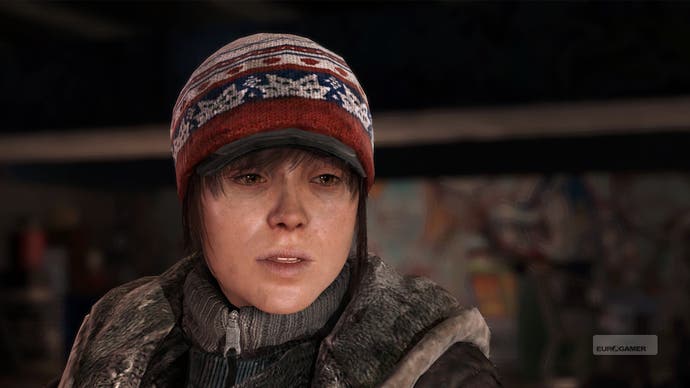
Cage denies that he's a frustrated film director, saying that his vision - a vision that Sony has invested heavily in, after the success of his last game Heavy Rain - is to blur the line between film and games and create a new form of entertainment. He has a point; just look at how the camera is handled. Where other games give the player complete control of the camera only to take it away for cut-scenes, Beyond's camera ebbs and flows, offering varying degrees of control according to the scene. Sometimes it tracks conventionally behind the main character, sometimes it cuts dramatically, sometimes it angles forcefully to suggest a mood or a direction or both: go this way, cautiously. The director never surrenders control completely, but rarely assumes it completely either.
Similar is claimed for the storyline, which follows Page's character Jodie from childhood to young adulthood, exploring her link with a disembodied entity called Aiden and recounting her many adventures - including an improbable spell as a superpowered CIA agent. Your choices and performance will affect how scenes play out, and cumulatively steer the game towards one of a claimed 23 endings.
Unlike Heavy Rain, however, Beyond avoids showstopping choices with obvious consequences, at least until its closing scenes. It's more about role-playing Jodie and Aiden, whom you also get to control in a woozy first-person mode where you float around doing poltergeist stuff: possessing soldiers, channelling memories, messing with radios, petulantly flinging paperweights at the wall. Will Jodie be direct or evasive? Will Aiden be vengeful or respectful? You modify the tone, but accept that the story is going wherever it's going.
It's more honest, in a way. Perhaps Cage is acknowledging that Heavy Rain's big, posturing dilemmas only ran skin-deep, and taking a more subtle approach to player choice. But without those obvious hooks - what would have happened if I did that? - and with too few meaningful diversions in too long a running time, a second play-through is a saggy experience. And, while I'm hardly going to slam Quantic Dream for showing too much delicacy, it does seem at odds with the storyline - which is scattershot, barmy and bombastic.
Heavy Rain was a melodramatic and quite odd take on the detective thriller, but Beyond makes it look as prosaic as an episode of Diagnosis Murder. This is very much a game by the David Cage that made 2005's Fahrenheit: doomy sci-fi with metaphysical pretensions and a slim grasp of logic, mixing very broad genre brushstrokes - explosions, mad scientists, spectral monsters - with simple domestic drama - teenage growing pains and office romance. Only this time, this mad pot pourri is made with Hollywood production values that extend to an actual Hollywood star and half a dozen action set-pieces that you'd sooner expect from a Naughty Dog game.
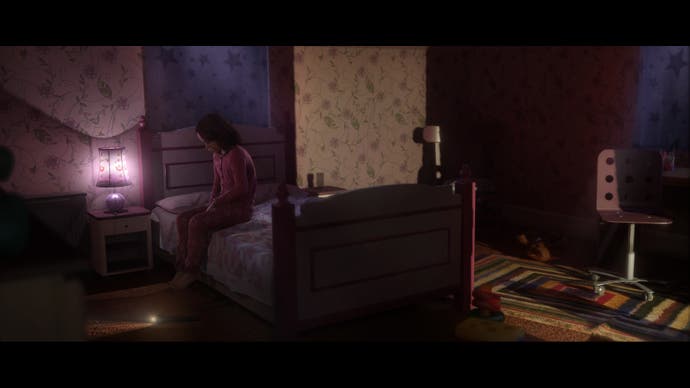
It barely hangs together, but it can be a pretty entertaining mix. Cage's best decision is to embrace the madness by hopping restlessly around the game's 14-year timeline, eschewing chronology completely. Take these three consecutive scenes from the middle of the game. The first is a domestic slice-of-life with Jodie as a little girl, bored at home one Christmas, scared of the monsters under the bed. Then she's a teenager in a pulpy action-horror sequence, exploring a burning facility where the Department of Paranormal Activities has opened a rift to "the other side" and its evil "entities" (coyly, no-one ever utters the word "ghost"). Then there's a gruelling, sentimental episode from a few years later, with Jodie a starving hobo on snowy city streets.
It certainly holds the interest, if only because you never know what's coming next. And it's not all that disorienting because each scene is fairly self-contained. You're kept busy piecing the central threads of the story together - which is just as well, because presented in plain order, they'd be weak.
On its big paranormal mystery, Beyond is inconclusive beyond the broadest generalisations and a crushingly obvious revelation of the nature of Jodie's link to Aiden. The rest of the plot concerns some predictable and vague stuff about government agencies seeking to exploit Jodie's gift and the power of rifts to the other side. The final third of the game consists largely of desperate, world-saving missions into secret bases - surprisingly conventional, video-gamey material which is poorly served by the limited interactivity and stodgy controls of Quantic's interactive drama formula.
Cage fares better when he's working in a more intimate, more human register. Although some scenes have a weird mundanity to them - you sometimes question why you're spending your time hammering the X button to draw a picture or tilting the right stick to pick up a bottle and put it down again - it's often these moments in Jodie's life that turn out to be the most evocative and memorable: an awkward date under Aiden's jealous gaze, the bored rage of a confined teenager.
Ellen Page can take a lot of the credit. She's well cast as a vulnerable, introspective woman with a heavy burden, and gambles on underplaying the part, using long silences and a halting, low delivery to draw you in. Vocally, it's superb work. Quantic's performance capture technology can't reliably replicate such subtle acting, unfortunately - Jodie often strays in and out of the uncanny valley within a single scene - but it can sometimes, and that's enough of a feat. Then there's the added frisson, for the player, of inhabiting and controlling such a magnetic screen star, recognisable right down to her awkward, hunched walk. It's a weird, powerful, new sensation. This isn't how we're used to relating to our icons.
Willem Dafoe fares less well as Nathan, the kindly scientist who studies Jodie and acts as her surrogate father. His delivery seems flat, although that might be because Quantic's animators have more trouble bringing his mournfully lined face to life. It might also be because Nathan, like all of Beyond's characters, is underwritten, his motivations and arc predictable. For all his cinematic ambition and visual flair as a director, as a writer Cage doesn't have a register above TV soap. There's honest feeling in the script, but nothing you could call wit or insight.
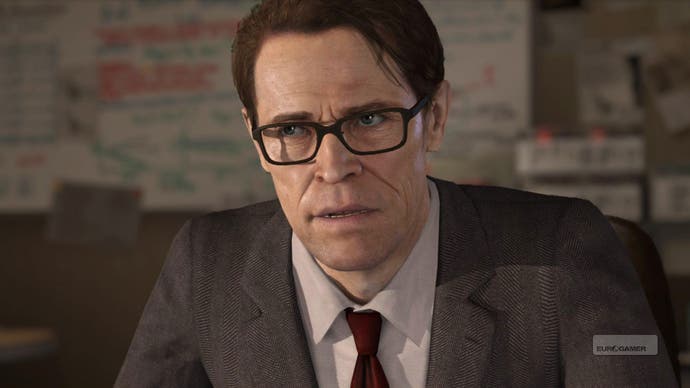
Heavy Rain worked because it was a police procedural, a genre that's all about narrow horizons and methodical reassurance. The tight confines of Quantic's style suited it well. The same delivery just can't contain Beyond's epic scope, preposterous premise and high-octane action. You're left feeling detached from it, and its component parts have nothing more than a frail spine of story holding them together.
And something else has changed since 2010: it's a lot less lonely on the interactive drama frontier. The indie scene has seen an explosion in narrative games using experimental styles as varied as To the Moon, Gone Home and Thirty Flights of Loving. The Walking Dead has looked toward TV and comics and proved the value of the simple dramatic virtues: strong characters, solid writing, interesting situations. Even dumb action games like Asura's Wrath have got in on the act.
Beyond's approach is no less valid than any of those. But the film stars, the motion capture tech, the black borders, all that expensive striving to look just like a movie, don't make it any more valid either. Perhaps what David Cage and his dream need are limitations - limitations that Sony's blank cheque has singularly failed to impose on this sprawling, over-reaching game.
